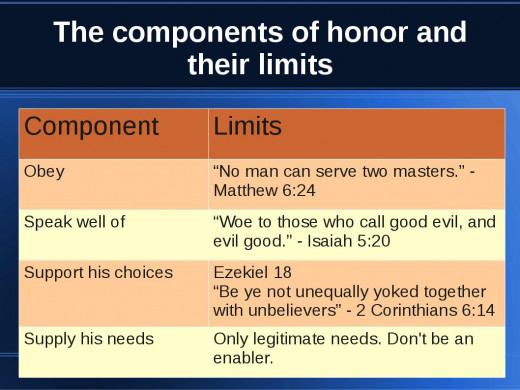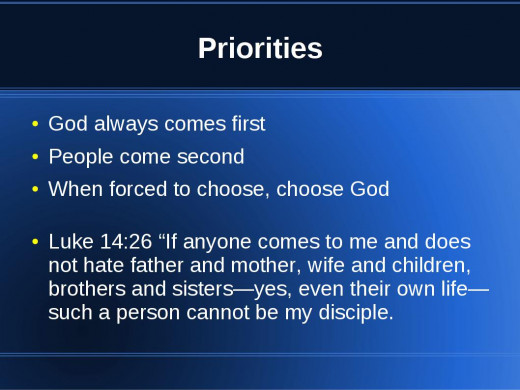Honor Your Father and Mother?
One of the biggest mistakes a well-meaning but sheltered Christian can make in witnessing is telling someone from a dysfunctional family to honor his father and mother. If this shocks you, then I'm talking to you. It's a terrible mistake for two reasons: first, because it can utterly alienate even the most open seeker from the world, and secondly, because it comes from a misunderstanding of the Bible. Bear with me a while and I will make clear just what I mean.
Everything in the Bible must be taken in context, because everything that exists in this world can only be understood in context. The conext for a Bible verse is the passage it's found in. The context for the passage is the entire Bible. The context for the Bible is life. The Bible explains life, and life explains the Bible. If you lack knowledge of either one of these things you cannot make sense of the other. So before we get into the Bible, let's talk a bit about life.
By way of example, let's look at my early life. My father was a mean drunk. He had two moods: surly and violent rage. He rarely ever said or did anything that wasn't bad. He never showed any sign of love or even consideration to anyone. Why did he have kids? I can only presume that he hadn't thought things through. As for my mother, she was... stupid, There's no other word for it. My father was the first in a long line of ill-considered relationships. I don't think she ever dated anyone who wasn't a substance abuser.
I had a brother at one point. He didn't make it. He was found in the backyard, skull bashed in, half buried in a shallow grave. It was our father who found him. Dad was very drunk that night, as he often was. No witnesses. I'll never know for sure what happened, and I'll never shake my suspicions.
In my teen years, I started searching for God. Unfortunately, I ran into a church full of people who told me to honor my father and mother, no matter what. The pastor told me straight to my face that i should submit to my mother and the drug addict she had recently married, in order to be a witness to her. Because I didn't know at that age what enabling was, I actually tried it. Of course it only confirmed her in her bad choices, and she and I both continued to suffer the consequences.
I was close to giving up on religion when I decided for the sake of due diligence to read the entire Bible for myself, That's when I discovered how badly those Christians had distorted the word of God. Yes, the Bible says honor your father and mother. It does not say always. There is a tendency for certain people to add an imagined "always" at the front of a Biblical directive, and not bother to check what else the Bible says on the subject.
The Bible says we are to honor our parents. It says so rather strongly, and repeatedly. There are blessings promised if we do, and we are called apostate if we don't. The Bible doesn't bother to give any reasoning behind the commandment. It's presumed to be self evident. But then there are these other commandments:
Isaiah 5:20 "Woe to those who call good evil, and evil good." Note the strong wording here. This is a very important proscription. If my father is evil and I praise him, then I am a liar and the truth is not in me. In modern parlance, I am an enabler.
Luke 14:26: "If any man come to me, and hate not his father, and mother, and wife, and children, and brethren, and sisters, yea, and his own life also, he cannot be my disciple." Nearly everyone who comes to Christ from the world must disregard his family's wishes in order to do so. I know a woman from a Buddhist background who became a Christian. Her parents called her a traitor and disowned her. That's an extreme example, but something similar will happen in nearly any society. No one can serve two masters. I suppose if your parents were Christians then this doesn't apply to you. However, if your church is fullfilling the Great Commission then believers born and raised by believers will be a small minority in the church. (If you're not a minority in your church then you need to ask yourselves why not.)
Ezekiel 18 -- the entire chapter -- speaks directly to someone from a worldly background. "The son will not share in the guilt of the father" unless he follows in those same sins, in which case he definitely will share in the guilt. If your father is evil, take responsibility for your own actions by not following in his ways. But don't expect your father to take it well! He will feel dishonored, and he will tell you so. It's a common thing for a criminal to pressure his sons to follow him in his criminal enterprises. The film At Close Range was based on a true story. Would you tell Sean Penn's character to honor his father? I certainly hope not. This is one reason why Ezekiel has an entire chapter devoted to the problem. Does Ezekiel 18 get preached in your church? If not, why not?
Finally, there is every other commandment in the Bible. Every single one. If your father tells you to disobey any or all of those commandments, you either honor him or you honor God. Let's take an example from the Bible. Jonathan, son of Saul faced this situation on an ongoing basis. Christians love to talk about how Jonathan was a good and loyal friend to David. They don't like to talk about how he had to defy his father in the process. Jonathan couldn't have it both ways. Life didn't allow him that luxury. He chose what was right. I identify with this story because I had a father very much like Jonathan's -- a violent, dangerous lunatic. Such fathers are not at all rare. Doubtless Jesus had Jonathan and Saul in mind when He told us to "hate" our fathers.

The Bible is not a simplistic book. It fully appreciates the complexities of life in the real world. Unfortunately, many Christians do not appreciate the complexities either of the Bible or of the real world. They can do collossal damage when they try to evangelize. This church I talked about earlier nearly converted me to atheism. They might have done much better to talk to me about Jonathan and Saul, but no... they never mentioned any of that. It was if they had never read that part of the Bible.
Don't read things as absolutes that aren't written as absolutes. Atheists like to point out all the ways that the Bible contradicts itself, but the Bible doesn't contradict itself unless you take everything as an absolute. Too many Christians fall into the same error as the atheists. The Bible, like life, is more about priorities than absolutes.
Commandments will come into conflict in specific situations, and if you don't recognize that some commandments carry more weight than others, you will be caught in double binds. The commandment to honor God carries more weight than the commandment to honor your parents. If you're lucky enough to have good Christian parents then this conflict won't arise in your own life. But understand that your case is not the general rule. Lose track of this truth and your attempts at evangelizing may backfire badly.

So then, what about all these verses telling us to honor our parents? If many families are utterly dysfunctional -- as even the Bible acknowledges is true -- can these verses have no relevance at all to so many people? They can indeed be relevant, and now that we've looked at the Biblical context we can begin to understand just how. Let's look at some more examples from life.
It turns out that sometimes a believer can convert his or her family by example, but not by giving them absolute obedience. I know a woman who was successful in bringing her family to Christ, but she had to leave them for a while first. Only after she had shown them that they had no power over her could she get them to take her seriously. That's how it's done. By the way, she was from a society that isn't Christian, but does take filial piety as an absolute -- to the point of actually making a religion out of it. To honor anything above God is spiritual idolatry, and in some parts of the world family values are quite literally idolatry. The society I speak of has many terrible family problems. Child abuse and neglect are all too commonplace, as is suicide among the young. Here is proof that there is such a thing as honoring your parents too much. Be an example, not an enabler!
As for myself, I have pitied and forgiven my parents. I have rescued my mother financially on a number of occasions. She never could handle money. After my father had drunk himself to death I gave him a decent funeral. You could call this honoring your parents after a fashion, although it doesn't involve obedience to them or even speaking well of them. It was all I could do for them without violating various and sundry other clear directives of the Bible. These expenditures on my part weren't motivated from a desire to honor them. They were motivated by compassion, not respect. I revere truth too much to revere anything that it is contrary to truth, and I honor God too much to honor anything or anyone opposed to God. They were what they were, and God is what He is.
If your parents are good Christian parents, you have no excuse not to honor and obey them as a general rule. If they are thoroughly evil, then to honor them at all is to dishonor God. Most parents are somewhere in between. Everything they demand of you, decide on a case-by-case basis. Remember, God comes first. To honor God above all else is the very first of the Ten Commandments, because it has top priority. Remember this, and you may find ways to do something for your parents without enabling sin in the process.
All well-meaning Christians who have had the privilege of growing up in Christian households, remember this: what applies to your case does not apply universally. Your upbringing was highly unusual. Don't be too quick to tell people from outside what to do about the situations they face that you have never faced. You won't convert anyone if you're arrogant and out of touch. But if you know the Bible -- the entire Bible -- you might just be able to point them to passages that apply to their lives instead of just applying to yours.






